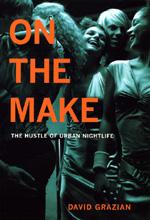The fraud of nightlife

David Grazian’s entertaining exploration of the bars of Philadelphia in On the Make: The Hustle of Urban Nightlife, continues to attract attention. Two new articles have recently been published featuring Grazian’s new book—the first appeared in the January 18 Chronicle Review and includes some great praise for the book’s revealing look at inner city nightlife:
Grazian’s new book is, among other things, a long catalog of confidence games. Nightclub managers strain to persuade the world that their typical patrons are younger, less suburban, and more female than they actually are. For a secret payment of $500 per week, one Philadelphia publicist… will bring four attractive, well-connected friends to a club…
There are also the more-familiar kinds of interpersonal fraud: In bars like Tangerine, people sometimes lie about their ages, their names, their jobs, and their marital statuses. Women give out fake phone numbers to shake off obnoxious suitors. People feign a sexual interest in others in order to score free drinks, to make their lovers jealous, or simply to make the evening less boring.
“What’s skillful about the book is that these are settings that people are familiar with, but often don’t think very hard about,” says Joshua Gamson, a professor of sociology at the University of San Francisco who specializes in commercial culture. “Grazian manages to make them seem new, without trying to oversell his analysis. The book has an appropriate level of seriousness and an appropriate amount of pleasure.”
A lengthy review also appeared in the January 20 Toronto Star. Geoff Pevere writes for the Star:
Plunging into clubs, bars, strip-joints and restaurants, [Grazian] collects first-person testimonies from hustlers, horndogs, would-be makeout artists and dozens of variously candid members of Philadelphia’s burgeoning night-life industry. While this serves the highly reader-friendly function of leavening his occasionally concrete prose with regular bursts of profane, party-down plain-spokenness, it also brings a welcome humanity to what might otherwise have been a clinical case study in the overall decline of contemporary civilization. And make no mistake: what happens in Philadelphia doesn’t stay in Philadelphia. If there’s one thing about the book which makes it resonate beyond those city limits, it’s that the city he describes is any city where there’s an “entertainment district” catering to the largely false promise of sex in the city.
Read an excerpt from the first chapter.